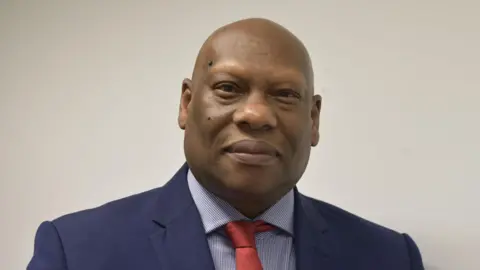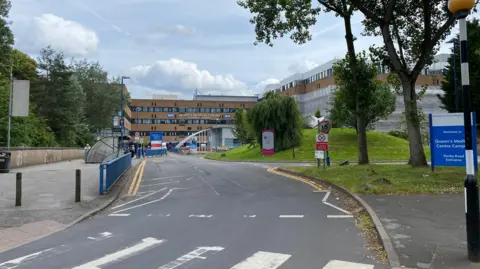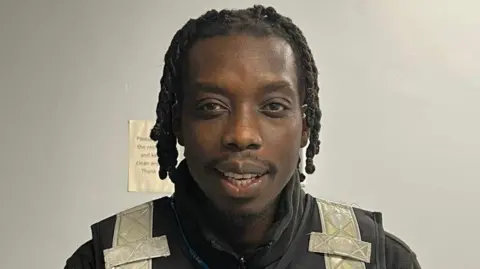NHS staff facing rise in racist abuse, trust says
 NUH
NUHNHS staff are facing an increase in racially aggravated abuse, violence and harassment, a hospital boss has said.
Instances of staff being hit, spit at or verbally assaulted at the Queen's Medical Centre (QMC) and City Hospital, in Nottingham, have led to some needing medical attention.
Nottingham University Hospitals (NUH) NHS Trust introduced a red card system in January 2023, effectively banning abusive members of the public and patients from accessing treatment at its two sites.
Gilbert George, director of corporate governance and legal at NUH, said despite the trust taking "proactive action" to respond to the issue, he felt it was becoming "very common".
The red card system works by the trust giving perpetrators a verbal warning before issuing a yellow card - essentially a second warning.
If that behaviour is repeated, the trust can issue a red card, which means that person cannot be treated at a hospital.
"What we're saying to that individual, is that we're no longer prepared to treat them at this hospital unless it's an emergency situation or under our provided licence we have to care for them," Mr George said of the red card.
He added the trust would facilitate a patient's move to another hospital.

In the financial year from 1 April 2021 to 31 March 2022, NUH recorded 1,237 incidents of aggression, violence or harassment (AVH) towards staff.
That figure increased to 2,370 in the 2023-24 financial year.
And between April and October 2024, 1,154 incidents were recorded, and the trust handed out 14 red cards and 12 yellow cards in that time.
Of this year's incidents, 103 have led to police involvement, with one person charged, according to the trust.
An NUH spokesperson said the increase in recorded incidents was also likely due to more people reporting them.
'Demoralising impact'
"What we've seen is an increase and emergence of racially aggravated AVH by either verbalising aggression, hitting our staff and even spitting at times," Mr George said.
"Staff themselves have needed medical care because of out-lashing by members of the public or patients towards our staff, which is really not acceptable."
In some cases, staff had needed to take time off work to recuperate.
Mr George added the "demoralising impact" of AVH affected the "whole community".
"What we've got to realise in regards to our staff is that they are mothers, fathers, they are grandparents, they are members of the community," he said.
Mr George believed overcrowding and delays had been a factor in patients' frustration, leading to AVH.
But he said he had also seen a "decline in the general respect towards public servants".
Earlier in the year, NUH also trialled bodyworn cameras for emergency department staff and have since expanded the scheme to ward staff.
"I would love to say that I would hope to see the numbers go the other way and see a reduction in [AVH], but I fear the numbers may increase," Mr George said.
 NUH
NUHSecurity guard Baboucarr Bojang said abuse had become an "everyday struggle".
"Sometimes people or patients - they feel so entitled and they feel like they can talk to some of the staff any way they want.
"There's a way to speak to others and the way some of the patients speak to staff is unacceptable," he said.
But on the other hand, he added, some of those people were also seeking help.
"What can you do? Sometimes all you can do is be patient," Mr Bojang said.
The troublemakers Mr Bojang said he had encountered were often under the influence of drugs or alcohol, making it difficult to de-escalate a situation.
"It can be hard to put your point across to them and for them to understand and reason with you, there's just no way to do it sometimes.
"Sometimes it's really hard, they can be really physical and verbally abusive," he said.
Follow BBC Nottingham on Facebook, on X, or on Instagram. Send your story ideas to [email protected] or via WhatsApp on 0808 100 2210.
